I live in an area where there are robust Amish and Mennonite communities. While I’ve certainly moaned a time or two getting stuck behind their horse-drawn wagons, I’ve also had some very insightful interactions with them and their culture. Diving a little deeper I’ve picked up some important lessons that I think prepared-minded people can benefit from.
If nothing else, consider the following things I learned from the Amish to be food for thought, when refining your own preparedness and survival strategies.
Self-Sufficiency Is a Priority
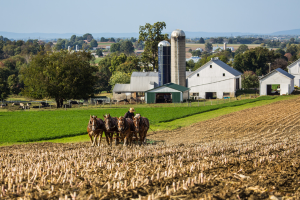 The way the Amish make self-sufficiency a priority isn’t just about having enough food stored up, seeds in stock, and enough agricultural supplies to be sustainable.
The way the Amish make self-sufficiency a priority isn’t just about having enough food stored up, seeds in stock, and enough agricultural supplies to be sustainable.
Making self-sufficiency a priority conjures up a lot of other supporting lessons and attitudes.
The Amish trust themselves to be problem solvers. If a well runs dry, they don’t call up the county extension office or call in a tanker truck to have water delivered. They go out and make a new sand point well.
When they need a piece of furniture, they don’t check their credit score and try to finance a new couch at the furniture store. They find some quality oak, pull out a few hand chisels and they create a new piece of furniture that will last for a century.
You can find a lot of useful information in an amazing guide, called The Amish Ways, written by Eddie Swartzentruber, who grew up in an Amish community but left when he was just 17. In this book, he’s opening up about their way of life and sharing their best-kept secrets—simple, natural tips that could make your life so much healthier.
Lesson for Preppers
The Amish dedication to self-sufficiency is about more than just having a sustainable food source. It also helps them become better problem solvers, while also prioritizing quality in their choices. This helps them save an enormous amount of money.
The products they learn to make with their own two hands also have top-dollar value. They then sell them at premium prices to non-Amish people who prize the impeccable quality of their handmade goods.
Cultivating a Sense of Community
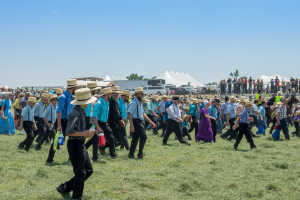 The Amish have a very strong sense of community, coming together not just for religious worship, but also to work together toward common goals.
The Amish have a very strong sense of community, coming together not just for religious worship, but also to work together toward common goals.
The community mindset they foster opens doors for sustainability and growth for everyone in the community.
There are no contractors’ fees involved in Amish barn raising or community field plowing. They come together to help one family, with the understanding that the family will one day join in to help others with their big projects.
Related: 15 Survival Foods That Are Better At Amish Stores
This has several benefits that go beyond the idea that many hands make light work. This sense of community gives everyone a greater sense of safety. Families know that if they get into trouble, there will always be a neighbor available to help them.
Lesson for Preppers
The social networks that evolve out of the Amish sense of community make it easier to barter for a fair trade. This can be a major advantage when a prolonged disaster strikes. Good relations with your neighbors make it easier to trade for the things you need to survive the state of strife.
The Amish sense of community and cooperation also promotes forgiveness. This quells animosity and festering resentments that can create roadblocks for future bartering, or potential family feuds.
In a prolonged disaster situation, being able to patch up relations with your neighbors and trade partners can quell tensions. It could even open up the door to reconciliation rather than the security threat of a feud.
Modesty
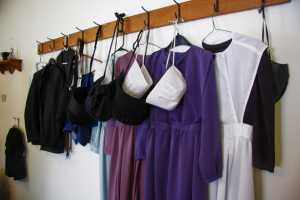 The Amish sense of modesty and minimalism originates from their religion. Yet it has a lot of functional value in how it frames their mindset in other areas of their life.
The Amish sense of modesty and minimalism originates from their religion. Yet it has a lot of functional value in how it frames their mindset in other areas of their life.
Modesty, which includes dressing in plain clothes and without affectations, accessories, jewelry, or signs of wealth, limits their sense of vanity. It also prevents the envy of others. The Amish don’t look at each other with a sense that the grass is greener on the other side of the fence or that they need to keep up with the Joneses.
The Lesson for Preppers
Making a conscious effort not to show off what you’ve got, reduces the chances that someone will try to take things from you from you. Rather than trying to look like a major threat to dissuade near’ do wells, you simply don’t look like a target.
Minimalism & Simplicity
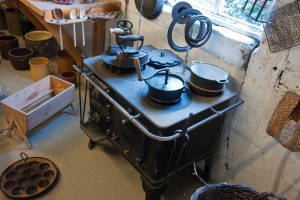 The Amish notion of minimalism and living a simple life has ties to their religious sense of modesty. Yet it’s about more than just compliance or a rural subsistence lifestyle.
The Amish notion of minimalism and living a simple life has ties to their religious sense of modesty. Yet it’s about more than just compliance or a rural subsistence lifestyle.
They focus on needs over wants and avoid unnecessary consumption.
When it comes to preparedness this simplistic approach also helps save a lot of money. The Amish don’t spend money on things beyond what they need.
They don’t have $100 a month dropped on subscriptions and streaming services they rarely use. They don’t spend money on high-end hair “Products” or even getting a fancy new horse-drawn carriage that will impress the neighbors. They don´t even spend their money on medication. Instead, they make their own natural effective remedies. One is this is the Amish cough syrup, that you can use to calm coughs, sore throats, and congestion. It’s very easy to make, and you only need five ingredients that you probably already have at home!
Lesson for Preppers
The money saved by embracing a minimalist lifestyle can be put toward improving your disaster preparedness strategy. Not to mention being able to apply it to improve your everyday sustainability.
You start having more money in the budget to put in that drip irrigation system. Affording those rooftop solar panels to provide you with quiet electricity suddenly becomes within reach.
Related: Hand-Powered Tools You Need to Live Off Grid
Whatever it is you need to improve your survivability chances happen to be, the money-saving value of a minimalist lifestyle definitely has rewards.
Off-Grid Living
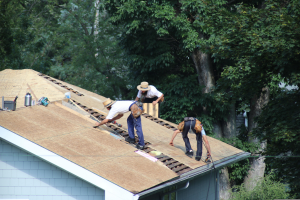 The Amish abstain from using electricity and instead rely on other energy sources such as kerosene lamps, hand tools, and wind power.
The Amish abstain from using electricity and instead rely on other energy sources such as kerosene lamps, hand tools, and wind power.
They also preserve their foods by fermenting, pickling, using a root cellar, or storing meat in an icehouse.
One of the biggest challenges people face in a natural disaster is the loss of electricity. Their meats and perishable foods spoil, they can’t communicate with the outside world, and they can’t get news. Some can’t even open their garage door to get their car out!
But you don’t have to be part of an Amish community to start living independently or be self-sufficient. There is a guide designed especially for that purpose, called No-Grid Survival Projects, and I totally recommend it. The author of the book, Michael Major, has even filmed himself building the 70 projects, which might be of use for all of us who have no DIY experience. Here are 70 ingenious projects that can help you protect your own family in times of economic crisis.
Lesson for Preppers
Learning alternative ways of preserving fresh foods, having hand tools, and knowing how to use them will put you ahead of the curve when SHTF. Simply relying on solar panels or a generator to get you through a disaster, can become its own disaster when they fail.
Practicing the ability to live without electricity and having active sustainability measures in place now, will make it much easier to survive when disaster strikes.
Food Preservation
 Amish families are skilled in traditional food preservation techniques, including canning, drying, and fermenting.
Amish families are skilled in traditional food preservation techniques, including canning, drying, and fermenting.
However, it goes beyond just living off the grid, and not having electricity to run modern refrigeration.
Lesson for Preppers
Many foods that are preserved with fermentation hold onto more key nutrients. They also have beneficial probiotic qualities that help support immune health.
Canning, fermenting, and long-term storage in root cellars also use less energy than a modern refrigerator or freezer. By adopting these strategies into your own food preservation system, you end up saving money on energy costs. And here is a strange method that will make your food last for 2 years without refrigeration.
Spirituality and Mindset
Their deep relationship with their faith gives the Amish a greater sense of peace and purpose. As outsiders, it’s easy for us to dismiss this as being simply a part of their religion.
Yet the disciplined mindset their faith cultivates translates into greater consistency with the positive habits in their everyday life. The Amish don’t complain about getting up at 5:00 AM to start their day or struggle to stay fit and healthy. They find it easy to abstain from eating junk food, getting drunk, smoking, or engaging in other bad habits.
Lesson for Preppers
By adopting a greater sense of self-discipline in your prepping strategy, you will find it easier to do things like get up early to work out. Not to mention how steering away from unhealthy foods and bad habits saves you money that can be spent elsewhere. I found a good online course where you have the chance to discover how to build a strong mindset in only 10 minutes a day. It´s a good place to learn a good skill in life, that is not taught in schools. It’s called True Grit, and having it means maintaining your determination and focus on achieving your goals despite experiencing setbacks and failure.
Gratitude
 The Amish also maintain an active sense of gratitude in both a religious sense and in their connection to others. When there’s a good harvest, they thank God for the good weather it took to get their crops through the season. When another person helps them, they recognize it and are thankful to them in the sincerest sense.
The Amish also maintain an active sense of gratitude in both a religious sense and in their connection to others. When there’s a good harvest, they thank God for the good weather it took to get their crops through the season. When another person helps them, they recognize it and are thankful to them in the sincerest sense.
Lesson for Preppers
Today modern psychology has found that “Gratitude Practice” can help not only with mental health, but physical health.. People who practice gratitude tend to have a more positive outlook with less anxiety, and better stress management skills. This can help both the mind and body as well as improve sleep quality. All of which are critical for survival during a prolonged disaster.
There’s also a growing body of research that suggests how maintaining gratitude can even improve someone’s pain tolerance.
Final Thoughts
The Amish way of life might seem pretty basic at first glance, but when you get to know them, I think there are a lot of lessons preppers can find valuable. Larger concepts like prioritizing self-sufficiency, and cultivating a sense of community, lead to smaller important lessons in their everyday lives.
Resilience and embracing living off the grid make the Amish natural problem solvers. While also giving preppers a blueprint on how to live well, even if the electrical grid goes down in the long term.
Of course, with all of these lessons, there’s a sense of frugalness that leads to saving money. The funds you might have spent on distractions, affectations, jewelry, or bad habits can be better spent on improving your preparedness strategy.
You may also like:
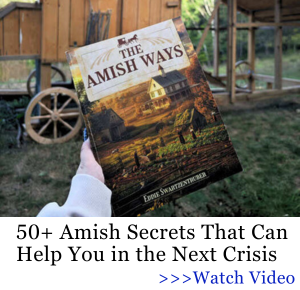 These Are the Best Chicken Breeds for Preppers
These Are the Best Chicken Breeds for Preppers
What Amish Would Never Store in Their Pantry, but Most Americans Do! (Video)
Survival Skills You Can Trade After SHTF

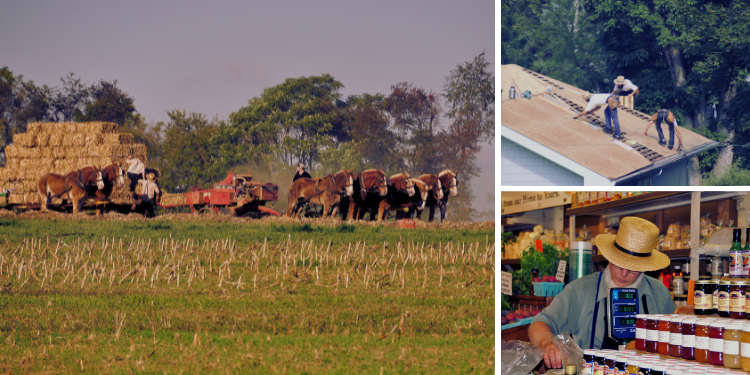













a few years ago a tornado came thru and took out an amish barn. the next day we drove buy heading to a friends house who also suffered damage and there were at least 50 amish workers building a new barn. at noon the frame was up and they were starting to put the siding on. our friend was still waiting on the insurance adjuster to come out. we could all learn a thing or two from the amish ways. very informative article, thankyou
Truth is , they support each other , stand with each other , learn together , have the same Goals , Faith, Trust, Beliefs
Yes , there is a GOD , Yes The worship God only , Yes the stand together against Fraud, Corruption, anti God leader s who Lie , Cheet , Steal , and remove the ten commandments so they can think they get away with something.
Fact there will always be a coming judgement , a present consequence, and a avenue of repentance and change .
The Amish are believers of faith and work , believe, trust God , they FEAR Gods Wrath, REspect each other , Foirgive Each other
Set standards along side the Bible to live by
unlike many others who just let all the liars live together and forbid you from praying, or speaking against WRONG , EVIL , And bad people .
At least their women know their place. And gossiping is frowned upon too.
They did what their husband told them to do.
None of this feminism nonsense none of this ‘I got ma rights’ BS either.
That is how the USA is supposed to be. How our founders set it up to be.
Then along came the progressives and screwed everything up.